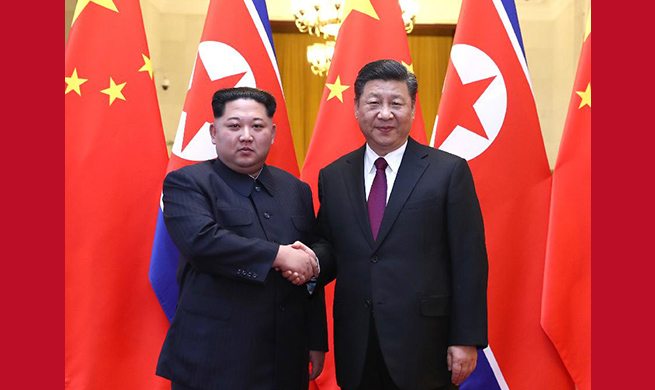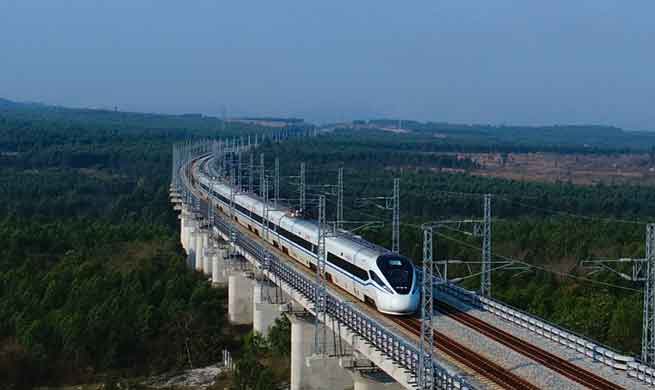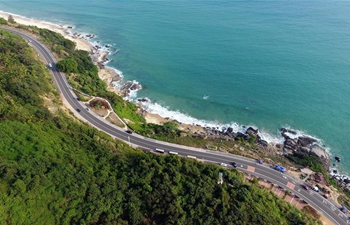By Gretinah Machingura
KARIBA, Zimbabwe, March 29 (Xinhua) -- Zimbabwean President Emmerson Mnangagwa on Wednesday commissioned the 300 megawatts Kariba South Hydro Power Expansion project which will significantly boost power supplies in the country that is seeking to revive its economy after nearly two decades of stagnant growth.
The expansion project done by China's hydro power engineering and construction firm, Sinohydro, added two generators with a capacity to produce 150 MW each at a total cost of 533 million U.S. dollars.
The project started in 2014 and was completed on schedule, with the first unit having been completed and started feeding into the national electricity grid in December 2017 while the test run for the second unit was completed two weeks ago.
The expansion project, arguably the county's first major power development project since independence in 1980, has lifted the power plant's power generation capacity from 750 MW to 1,050 MW, making it Zimbabwe's current largest power plant.
Kariba power station was commissioned in 1962 during the colonial era.
Speaking after commissioning the plant, 360 km north of the capital Harare, Mnangagwa said the launch of the project was a milestone achievement in the country's quest for development.
"I am delighted to officiate at this landmark ceremony to commission the switch-on of the Kariba South Power Station Extension Project.This event indeed bears testimony to my government's realization of the centrality of energy infrastructure to economic resuscitation and growth," Mnangagwa said.
He added: "The completion of this extension project is both commendable and most timely, as it will serve as a catalyst and an essential ingredient to all our endeavors in the economic re-birth of our country."
He said the additional 300 MW will help Zimbabwe, which has faced perennial power shortages for years, to reduce its power import bill.
The country has a national demand of 1,600 MW but is currently producing 1,200 MW. It plugs the shortfall through imports from South Africa and Mozambique where it imports 300 MW and 50 MW respectively.
"The 300 MW which we switch on today, comes at an opportune time as it will significantly reduce the power deficit and positively impact on our national energy import bill," he said.
The commissioning of the two generators comes a few days before Mnangagwa travels to China next week for his first state visit outside Africa since taking over from former president Robert Mugabe last November.
Mnangagwa said he will use the visit to thank China for completing the Kariba project as well as to seek more financial support to help revamp the economy.
He disclosed that Hwange Expansion Project to add 600 MW, also to be undertaken by Sinohydro at a cost of 1.1 billion dollars, had reached financial closure and work was expected to commence soon.
Chinese Ambassador to Zimbabwe Huang Ping confirmed intensified cooperation between Zimbabwe and China, saying the two countries will sign a series of cooperation agreements during Mnangagwa's visit.
Li Yueping, vice president of the Power China Group, the parent company of Sinohydro, said the Kariba expansion project had boosted Zimbabwe's power output by 30 percent, helping to drive industry and mining development, support economic recovery and light millions of households.
"As a project with national top priority, the Kariba South Extension Project is the largest power infrastructure project ever taken in the recent 30 years in Zimbabwe," said Li.
He said the Kariba project marked the start of the company's commitment to the improvement of infrastructure and people's livelihoods in Africa.
"In the future, we will continue to work jointly with our Zimbabwean partners for a new era and new journey," he said.
Sinohydro not only provided additional power to Zimbabwe giving impetus to economic growth, but empowered Zimbabweans through jobs and new skills.
Li said the Chinese firm employed 3,000 locals, trained hundreds of local technicians, donated to community schools and projects and helped orphans and children who need special care as part of their corporate social responsibilities.
Tafadzwa Bimha, 25, who is employed by Sinohydro and has been working at the site as a safety officer for two years, said his life transformed tremendously as he was able to buy two urban residential stands and other important assets due to the good salary he was getting.
"I am not sure whether Sinohydro will take me to their next project in the country but I am very grateful for the job they gave me which not only enabled me to boost my work experience but helped me to comfortably provide for my family," he said in an interview.
His sentiments were echoed by his colleague Phineas Jera who said Sinohydro had provided technical skills to many ordinary Zimbabweans.
"Sinohydro not only paid us good salaries on time. It gave us the opportunity to learn and gain experience and it trained many people who came here without any skills. They provided on-the-job training to many such that some who started as general hand workers are now welders," he said.

















